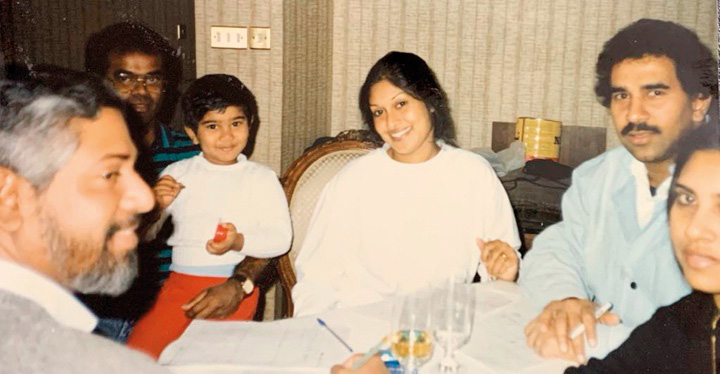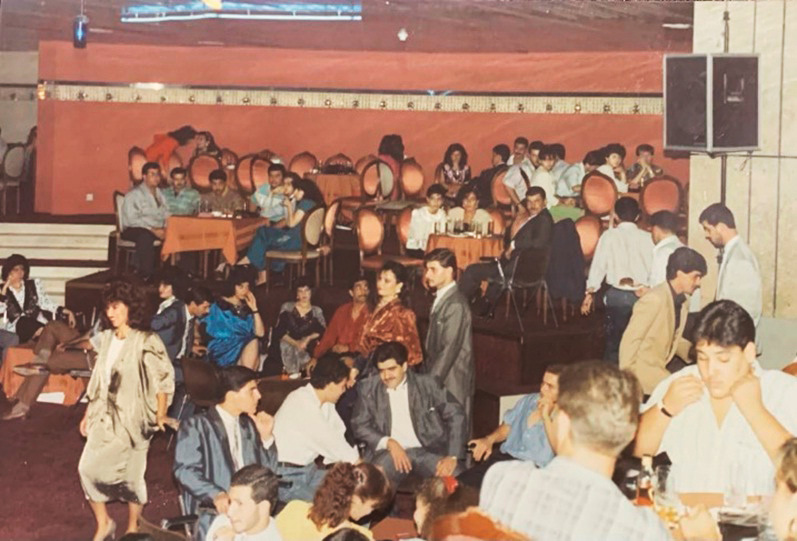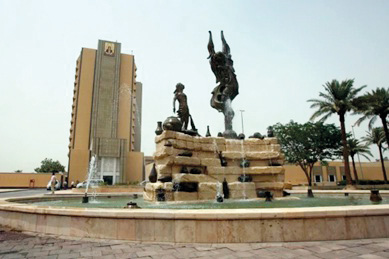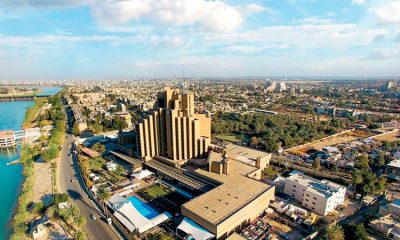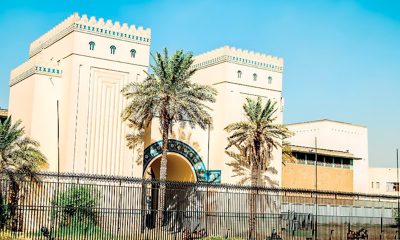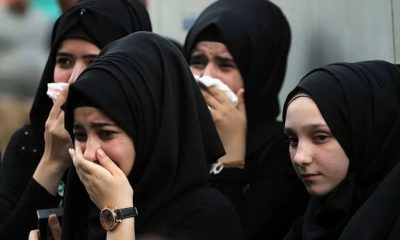Features
Culture Shock in Iraq
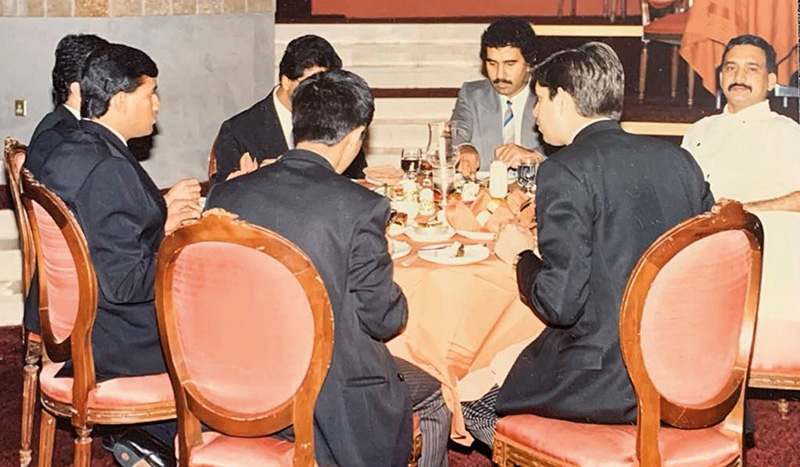
Part Two PASSIONS OF A GLOBAL HOTELIER
 Dr. Chandana (Chandi) Jayawardena DPhil
Dr. Chandana (Chandi) Jayawardena DPhil
President – Chandi J. Associates Inc. Consulting, Canada
Founder & Administrator – Global Hospitality Forum
chandij@sympatico.ca
First Impressions of Iraq
My first impressions of Iraq were positive. Upon arrival at Saddam International Airport, the opulence and modernity juxtaposed against the backdrop of a country rebuilding itself after a war. The warm reception and luxurious accommodations at Hotel Babylon Oberoi spoke volumes about the resilience and hospitality of the Iraqi people. The five-star standards of Hotel Babylon Oberoi, and facilities provided to my family at a corner suite facing Tigris River, were all positive. I was pleasantly surprised as these observations exceeded my expectations.
A tour of Baghdad for new managers of Hotel Babylon Oberoi arriving from Sri Lanka, during our second day, produced more pleasant surprises. A string of five-star hotels in Baghdad, managed by global hotel chains such as Sheraton, Le Meridien, Melia and Novotel, provided competition for Oberoi. Although wars always affect tourism negatively, wars also contribute to hotel revenues with new customers as military advisers from other countries, arm dealers, spies, mercenaries, international agencies, media representatives, reporters, journalists, etc. We were pleased to note that the best hotel in Baghdad was the 450-room Al Rasheed, and the best hotel outside Baghdad was the Nineveh Oberoi Hotel, a 262-room, five-star resort in Mosul overlooking the Tigris River. Both Al Rasheed and Nineveh Oberoi, were sister hotels of Hotel Babylon Oberoi.
The emergence of Iraq’s tourism and hospitality scene, with a plethora of international hotel chains vying for prominence, painted a picture of economic revitalization amidst the remnants of war. The three Oberoi hotels in Iraq managed a total of over 1,000 five-star rooms and Oberoi was the key player in re-building tourism in the post-war Iraq in 1989. Madan Misra, my boss, and the Oberoi Group (operator of 30 luxury hotels in six countries, with head office in New Delhi, India, founded in 1934), had good connections with the Iraqi government and the State Organization for Tourism in Iraq, which owned all hotels in the country.
Two of my Ceylon Hotel School colleagues, senior to me, worked at Al Rasheed. Nirmo Thambapillai was the Food & Beverage Manager for Banquet Operation, and Kamal Hapuwatte was the Training Manager. Another friend of mine (whom I met during an assignment at Muscat Sheraton in Oman in 1988 as the Guest Executive Chef for a Sri Lankan food festival), Priyantha Ratnasinghe, was the Assistant Financial Controller at Baghdad Sheraton. The camaraderie among colleagues from Sri Lanka added a comforting familiarity in an unfamiliar land. We met frequently during our free time.
When my wife and son joined me, they were warmly welcomed by everybody. My son, Marlon was only three years old and was the only child staying at the hotel. After he commenced going to the international school in Baghdad, every day when he returned from school, the staff inquired what he had learned. They often addressed Marlon and me as ‘Habibi’ (my dear or darling) and my wife as ‘Ainee’ (my eyes).
We soon realised that this type of loving terms are common in addressing each other in Iraq. People in Iraq are among the friendliest I have met during my travels to one hundred countries. After each welcoming handshake, most Iraqi men touched their chest expressing that the greetings came from heart. I loved that gesture so much, I practiced that from the time I settled down in Iraq, and in later years whenever I travelled to the Middle East for work and leisure.
The cultural diversity within Iraq, from the majority traditional Islamic customs to the cosmopolitan Christian communities, offered a multifaceted glimpse into the nation’s identity. Islam (approximately 55% Shia and 35% Sunni) was and still is the main religion in Iraq, and there was a Kurdish minority following the ancient religion Zoroastrianism. In 1989 most of the 1.5 million Christians (around 9% of the population) in Iraq lived in or around Baghdad.
They were far more westernized than other Iraqis. The Christian Iraqis generally provided good business to restaurants, bars, night clubs and casinos in Baghdad. The end of the war was also a period of celebration and enjoyment. It was good for the hotel and food and beverage businesses. I was surprised to see many beautiful Iraqi women dressed in western clothes and patronising the bars, night club and casino at Hotel Babylon Oberoi. Unfortunately, the Christian population in Iraq has shrunk to 1% of the current total national population of 47 million in 2024.
Navigating Challenges
The transition from initial optimism to navigating cultural nuances brought forth unexpected challenges and a string of culture shocks in Iraq. From adapting to the ubiquity of firearms, to learning the rhythm of work interrupted by prayer times, each obstacle became a lesson in understanding and respect. I treated these challenges as opportunities to learn the local attitudes, aspirations, behaviour, beliefs, customs, and culture.
Violation of ‘No-Gun Policy’
A major culture shock for us was getting used to the fact that most men in Iraq openly carried firearms. During my orientation week, I was taken around Babylon Oberoi by Mohamed Abdullah, the Iraqi Human Resources Manager, and T. P. Singh (TP), Indian Assistant Food & Beverage Manager, who was my deputy. On seeing hundreds of numbered pigeon holes at the entrance to Githara Night Club, I inquired what they wee used for. “Acha! Mr. Jayawardena, those are for carefully storing surrendered guns by our patrons, until they leave the night club. As Iraqis have a habit of shooting their guns at air in celebration when happy and drunk, we have a no-gun policy at Githara,” TP explained. “We don’t want them to destroy our expensive Baccarat chandeliers imported from France,” he added with a cheeky smile.
When I asked him, “Do all our customers adhere to hotel’s no-gun policy at the night club?” he was honest in his answer: “All but one group – President Saddam Hussein’s eldest son Uday and his gang of murderous bodyguards, who come to Githara every Thursday night!” That warning reminded me that I was assigned the role of the duty manager every Thursday night till Githara closed around 4:00 am or until Uday Hussein was ready to leave.
Over-boiling in Kitchens
During my orientation in the kitchens, I was somewhat taken back to notice some kitchen staff not bothering to reduce flames in the hot kitchen during the prayer times. More religious employees simply stop work, irrespective of the stage of their cooking tasks, when the bells rang in the nearby mosques. It was an unwritten law that no one should give work directions to employees praying for 10 to 15 minutes at a time. Non-Islamic members of the kitchen brigade, diplomatically reduced fires gently to ensure there was no over-boiling and over-cooking during the prayer times. I quickly got used to that custom. It is essential that expatriates understand, accept, and respect local customs and culture, particularly relating to religion. They must also quickly learn to ensure that there are no interruptions to the flow of work and quality of products and services.
Being Kissed by Men
During my orientation, there was an important wedding at the hotel’s ballroom. The bride’s father was a minister in President Saddam Hussein’s cabinet, and we wanted to ensure that everything was handled exactly as requested by the minister. I showed up a few times at the banquet hall during thereception. Out of 500 invitees, about half were beautifully dressed women who all sat on one half of the hall. When they made a frequent loud and long, wavering, high-pitched vocal sound, I was baffled. Our Egyptian Banquet Manager, Altaf, realizing that it was a new experience for me, said: “Boss, that’s zaghārīt, an ululation to honour the new couple.”
The other half of the hall was occupied by males, most of whom smoked, and held a Misbaha (a string of 99 beads traditionally used during prayer). When the minister saw me he was in a happy mood. He hugged me and gave four kisses on my cheeks. I nearly pushed him away, but when Altaf quickly gestured me to reciprocate, I hugged the minister in return. After learning that men hugging each other is common in Iraq, I too became an expert at it. Understanding the importance of cultural sensitivity and adaptation is a key for success in a global career.
Removal of Saddam’s Twin Photograph
I was given a large office. My secretary was Fatima, a very polite young Iraqi lady with an office next to mine. My first impression of my office was that everything except my desk and chair were green, and there were two large, identical, black and white framed photographs of Saddam Hussein hung on two walls. I politely suggested: “Fatima, do you mind transferring one of these photos of His Excellency to another executive office?”
The rest of the day, I could not locate Fatima. She eventually returned after several hours later looking nervous and pale, and was speechless. When I inquired what happened to her, she signalled me to come out of the office, and whispered to me, “Mr. Jay, removal of a photograph of the President will be reported to the Baath party head office as a major insult and there will be serious repercussions to both you and me.” I immediately changed my mind and requested Fatima to forget about my suggestion and not to mention it to anyone. During my turn in Baghdad, every day I looked at those two large photographs. I got used to it and realised that Sadam Hussein was a handsome man.
Wire Tapped Offices
There were rumours among other expatriate managers that all our offices were wire tapped. On hearing that any discussion in any executive office of a hotel can be heard at the Baath party head office, I laughed saying that it can’t be true. However, I decided to be extra careful in the future. The undercurrent of surveillance and espionage added an element of intrigue to daily life, with the realization that conversations held within the confines of our offices might not be as private as initially assumed.
Spies at Apartments
When I asked TP about various plainclothed men keeping a close eye on hotel activities, but not acting as customers, I was surprised of his answer. “Acha! Mr. Jayawardena, those are secret police and at times, spies,” TP said in a relaxed tone. He had been in Iraq for a few years and knew the ropes. When I asked him whom they spy on, he said, “Us, the foreign managers.” Then he became a bit jovial, tapped on my shoulder in a friendly gesture, and said: “welcome to Baghdad, Mr. Jayawardena!” Soon I realised that there were spies everywhere. No one knew who was spying on whom. This was common in most countries led by iron-fisted dictators. The subtle yet persistent presence of secret police underscored the complexities of operating in a society under scrutiny.
Every week, Friday was my off day. Usually on Fridays my family went on full day outings or visited the Hapuwatte family living at the executive quarters of Al Rasheed Hotel. At their apartment we played cards, had a couple of drinks, had a home-cooked Sri Lankan meal, and spoke about our memorable Ceylon Hotel School years. On the first Friday we went out, when we returned, my wife said “Someone has been in our suite.
The books and magazines we left on the coffee table have been re-arranged! Can’t be housekeeping staff, as I have told them not to do cleaning work on Fridays.” On checking with the General Manager’s wife, we found out that it was the normal practice for Iraqi secret police to visit expatriate manager’s apartments when they are away and leave some clues to show us that they have visited! When my wife was upset about it, I told her: “Shani, don’t worry, unless we lost any of our belongings. When in Rome, do as the Romans do.”
Initial Optimism and Challenge in Iraq
Despite these challenges, I commenced my work optimistically. My senior team leaders in the food & beverage division agreed with me to organize regular food festivals, open new restaurants with exciting new menus, and do lots of training. I was able to motivate the team and win the support of our regular customers.
The collaborative spirit and innovative mindset fostered a sense of unity and purpose amidst uncertainty. Executive Chef O. P. Khantwal (OP) became my right-hand man while implementing our innovations for a new era. OP was a well-trained senior chef of the Oberoi Group and the first chef I worked with who had an MA degree qualification. OP knew the Oberoi culture very well and soon became a loyal advisor to me.
was a well-trained senior chef of the Oberoi Group and the first chef I worked with who had an MA degree qualification. OP knew the Oberoi culture very well and soon became a loyal advisor to me.
As my team was settling down and developing our new business plans, we were faced with a shocker. The bureaucracy and red tape in Iraq resulted in delays of the work permit process for new workers. We were asked by authorities to stop work until all work permit final approvals are received. As a result, we spent two unproductive weeks, without working. I decided to use that challenge as an opportunity to explore Iraq as a tourist.
Features
The heart-friendly health minister

by Dr Gotabhya Ranasinghe
Senior Consultant Cardiologist
National Hospital Sri Lanka
When we sought a meeting with Hon Dr. Ramesh Pathirana, Minister of Health, he graciously cleared his busy schedule to accommodate us. Renowned for his attentive listening and deep understanding, Minister Pathirana is dedicated to advancing the health sector. His openness and transparency exemplify the qualities of an exemplary politician and minister.
Dr. Palitha Mahipala, the current Health Secretary, demonstrates both commendable enthusiasm and unwavering support. This combination of attributes makes him a highly compatible colleague for the esteemed Minister of Health.
Our discussion centered on a project that has been in the works for the past 30 years, one that no other minister had managed to advance.
Minister Pathirana, however, recognized the project’s significance and its potential to revolutionize care for heart patients.
The project involves the construction of a state-of-the-art facility at the premises of the National Hospital Colombo. The project’s location within the premises of the National Hospital underscores its importance and relevance to the healthcare infrastructure of the nation.
This facility will include a cardiology building and a tertiary care center, equipped with the latest technology to handle and treat all types of heart-related conditions and surgeries.
Securing funding was a major milestone for this initiative. Minister Pathirana successfully obtained approval for a $40 billion loan from the Asian Development Bank. With the funding in place, the foundation stone is scheduled to be laid in September this year, and construction will begin in January 2025.
This project guarantees a consistent and uninterrupted supply of stents and related medications for heart patients. As a result, patients will have timely access to essential medical supplies during their treatment and recovery. By securing these critical resources, the project aims to enhance patient outcomes, minimize treatment delays, and maintain the highest standards of cardiac care.
Upon its fruition, this monumental building will serve as a beacon of hope and healing, symbolizing the unwavering dedication to improving patient outcomes and fostering a healthier society.We anticipate a future marked by significant progress and positive outcomes in Sri Lanka’s cardiovascular treatment landscape within the foreseeable timeframe.
Features
A LOVING TRIBUTE TO JESUIT FR. ALOYSIUS PIERIS ON HIS 90th BIRTHDAY

by Fr. Emmanuel Fernando, OMI
Jesuit Fr. Aloysius Pieris (affectionately called Fr. Aloy) celebrated his 90th birthday on April 9, 2024 and I, as the editor of our Oblate Journal, THE MISSIONARY OBLATE had gone to press by that time. Immediately I decided to publish an article, appreciating the untiring selfless services he continues to offer for inter-Faith dialogue, the renewal of the Catholic Church, his concern for the poor and the suffering Sri Lankan masses and to me, the present writer.
It was in 1988, when I was appointed Director of the Oblate Scholastics at Ampitiya by the then Oblate Provincial Fr. Anselm Silva, that I came to know Fr. Aloy more closely. Knowing well his expertise in matters spiritual, theological, Indological and pastoral, and with the collaborative spirit of my companion-formators, our Oblate Scholastics were sent to Tulana, the Research and Encounter Centre, Kelaniya, of which he is the Founder-Director, for ‘exposure-programmes’ on matters spiritual, biblical, theological and pastoral. Some of these dimensions according to my view and that of my companion-formators, were not available at the National Seminary, Ampitiya.
Ever since that time, our Oblate formators/ accompaniers at the Oblate Scholasticate, Ampitiya , have continued to send our Oblate Scholastics to Tulana Centre for deepening their insights and convictions regarding matters needed to serve the people in today’s context. Fr. Aloy also had tried very enthusiastically with the Oblate team headed by Frs. Oswald Firth and Clement Waidyasekara to begin a Theologate, directed by the Religious Congregations in Sri Lanka, for the contextual formation/ accompaniment of their members. It should very well be a desired goal of the Leaders / Provincials of the Religious Congregations.
Besides being a formator/accompanier at the Oblate Scholasticate, I was entrusted also with the task of editing and publishing our Oblate journal, ‘The Missionary Oblate’. To maintain the quality of the journal I continue to depend on Fr. Aloy for his thought-provoking and stimulating articles on Biblical Spirituality, Biblical Theology and Ecclesiology. I am very grateful to him for his generous assistance. Of late, his writings on renewal of the Church, initiated by Pope St. John XX111 and continued by Pope Francis through the Synodal path, published in our Oblate journal, enable our readers to focus their attention also on the needed renewal in the Catholic Church in Sri Lanka. Fr. Aloy appreciated very much the Synodal path adopted by the Jesuit Pope Francis for the renewal of the Church, rooted very much on prayerful discernment. In my Religious and presbyteral life, Fr.Aloy continues to be my spiritual animator / guide and ongoing formator / acccompanier.
Fr. Aloysius Pieris, BA Hons (Lond), LPh (SHC, India), STL (PFT, Naples), PhD (SLU/VC), ThD (Tilburg), D.Ltt (KU), has been one of the eminent Asian theologians well recognized internationally and one who has lectured and held visiting chairs in many universities both in the West and in the East. Many members of Religious Congregations from Asian countries have benefited from his lectures and guidance in the East Asian Pastoral Institute (EAPI) in Manila, Philippines. He had been a Theologian consulted by the Federation of Asian Bishops’ Conferences for many years. During his professorship at the Gregorian University in Rome, he was called to be a member of a special group of advisers on other religions consulted by Pope Paul VI.
Fr. Aloy is the author of more than 30 books and well over 500 Research Papers. Some of his books and articles have been translated and published in several countries. Among those books, one can find the following: 1) The Genesis of an Asian Theology of Liberation (An Autobiographical Excursus on the Art of Theologising in Asia, 2) An Asian Theology of Liberation, 3) Providential Timeliness of Vatican 11 (a long-overdue halt to a scandalous millennium, 4) Give Vatican 11 a chance, 5) Leadership in the Church, 6) Relishing our faith in working for justice (Themes for study and discussion), 7) A Message meant mainly, not exclusively for Jesuits (Background information necessary for helping Francis renew the Church), 8) Lent in Lanka (Reflections and Resolutions, 9) Love meets wisdom (A Christian Experience of Buddhism, 10) Fire and Water 11) God’s Reign for God’s poor, 12) Our Unhiddden Agenda (How we Jesuits work, pray and form our men). He is also the Editor of two journals, Vagdevi, Journal of Religious Reflection and Dialogue, New Series.
Fr. Aloy has a BA in Pali and Sanskrit from the University of London and a Ph.D in Buddhist Philosophy from the University of Sri Lankan, Vidyodaya Campus. On Nov. 23, 2019, he was awarded the prestigious honorary Doctorate of Literature (D.Litt) by the Chancellor of the University of Kelaniya, the Most Venerable Welamitiyawe Dharmakirthi Sri Kusala Dhamma Thera.
Fr. Aloy continues to be a promoter of Gospel values and virtues. Justice as a constitutive dimension of love and social concern for the downtrodden masses are very much noted in his life and work. He had very much appreciated the commitment of the late Fr. Joseph (Joe) Fernando, the National Director of the Social and Economic Centre (SEDEC) for the poor.
In Sri Lanka, a few religious Congregations – the Good Shepherd Sisters, the Christian Brothers, the Marist Brothers and the Oblates – have invited him to animate their members especially during their Provincial Congresses, Chapters and International Conferences. The mainline Christian Churches also have sought his advice and followed his seminars. I, for one, regret very much, that the Sri Lankan authorities of the Catholic Church –today’s Hierarchy—- have not sought Fr.
Aloy’s expertise for the renewal of the Catholic Church in Sri Lanka and thus have not benefited from the immense store of wisdom and insight that he can offer to our local Church while the Sri Lankan bishops who governed the Catholic church in the immediate aftermath of the Second Vatican Council (Edmund Fernando OMI, Anthony de Saram, Leo Nanayakkara OSB, Frank Marcus Fernando, Paul Perera,) visited him and consulted him on many matters. Among the Tamil Bishops, Bishop Rayappu Joseph was keeping close contact with him and Bishop J. Deogupillai hosted him and his team visiting him after the horrible Black July massacre of Tamils.
Features
A fairy tale, success or debacle

Sri Lanka-Singapore Free Trade Agreement
By Gomi Senadhira
senadhiragomi@gmail.com
“You might tell fairy tales, but the progress of a country cannot be achieved through such narratives. A country cannot be developed by making false promises. The country moved backward because of the electoral promises made by political parties throughout time. We have witnessed that the ultimate result of this is the country becoming bankrupt. Unfortunately, many segments of the population have not come to realize this yet.” – President Ranil Wickremesinghe, 2024 Budget speech
Any Sri Lankan would agree with the above words of President Wickremesinghe on the false promises our politicians and officials make and the fairy tales they narrate which bankrupted this country. So, to understand this, let’s look at one such fairy tale with lots of false promises; Ranil Wickremesinghe’s greatest achievement in the area of international trade and investment promotion during the Yahapalana period, Sri Lanka-Singapore Free Trade Agreement (SLSFTA).
It is appropriate and timely to do it now as Finance Minister Wickremesinghe has just presented to parliament a bill on the National Policy on Economic Transformation which includes the establishment of an Office for International Trade and the Sri Lanka Institute of Economics and International Trade.
Was SLSFTA a “Cleverly negotiated Free Trade Agreement” as stated by the (former) Minister of Development Strategies and International Trade Malik Samarawickrama during the Parliamentary Debate on the SLSFTA in July 2018, or a colossal blunder covered up with lies, false promises, and fairy tales? After SLSFTA was signed there were a number of fairy tales published on this agreement by the Ministry of Development Strategies and International, Institute of Policy Studies, and others.
However, for this article, I would like to limit my comments to the speech by Minister Samarawickrama during the Parliamentary Debate, and the two most important areas in the agreement which were covered up with lies, fairy tales, and false promises, namely: revenue loss for Sri Lanka and Investment from Singapore. On the other important area, “Waste products dumping” I do not want to comment here as I have written extensively on the issue.
1. The revenue loss
During the Parliamentary Debate in July 2018, Minister Samarawickrama stated “…. let me reiterate that this FTA with Singapore has been very cleverly negotiated by us…. The liberalisation programme under this FTA has been carefully designed to have the least impact on domestic industry and revenue collection. We have included all revenue sensitive items in the negative list of items which will not be subject to removal of tariff. Therefore, 97.8% revenue from Customs duty is protected. Our tariff liberalisation will take place over a period of 12-15 years! In fact, the revenue earned through tariffs on goods imported from Singapore last year was Rs. 35 billion.
The revenue loss for over the next 15 years due to the FTA is only Rs. 733 million– which when annualised, on average, is just Rs. 51 million. That is just 0.14% per year! So anyone who claims the Singapore FTA causes revenue loss to the Government cannot do basic arithmetic! Mr. Speaker, in conclusion, I call on my fellow members of this House – don’t mislead the public with baseless criticism that is not grounded in facts. Don’t look at petty politics and use these issues for your own political survival.”
I was surprised to read the minister’s speech because an article published in January 2018 in “The Straits Times“, based on information released by the Singaporean Negotiators stated, “…. With the FTA, tariff savings for Singapore exports are estimated to hit $10 million annually“.
As the annual tariff savings (that is the revenue loss for Sri Lanka) calculated by the Singaporean Negotiators, Singaporean $ 10 million (Sri Lankan rupees 1,200 million in 2018) was way above the rupees’ 733 million revenue loss for 15 years estimated by the Sri Lankan negotiators, it was clear to any observer that one of the parties to the agreement had not done the basic arithmetic!
Six years later, according to a report published by “The Morning” newspaper, speaking at the Committee on Public Finance (COPF) on 7th May 2024, Mr Samarawickrama’s chief trade negotiator K.J. Weerasinghehad had admitted “…. that forecasted revenue loss for the Government of Sri Lanka through the Singapore FTA is Rs. 450 million in 2023 and Rs. 1.3 billion in 2024.”
If these numbers are correct, as tariff liberalisation under the SLSFTA has just started, we will pass Rs 2 billion very soon. Then, the question is how Sri Lanka’s trade negotiators made such a colossal blunder. Didn’t they do their basic arithmetic? If they didn’t know how to do basic arithmetic they should have at least done their basic readings. For example, the headline of the article published in The Straits Times in January 2018 was “Singapore, Sri Lanka sign FTA, annual savings of $10m expected”.
Anyway, as Sri Lanka’s chief negotiator reiterated at the COPF meeting that “…. since 99% of the tariffs in Singapore have zero rates of duty, Sri Lanka has agreed on 80% tariff liberalisation over a period of 15 years while expecting Singapore investments to address the imbalance in trade,” let’s turn towards investment.
Investment from Singapore
In July 2018, speaking during the Parliamentary Debate on the FTA this is what Minister Malik Samarawickrama stated on investment from Singapore, “Already, thanks to this FTA, in just the past two-and-a-half months since the agreement came into effect we have received a proposal from Singapore for investment amounting to $ 14.8 billion in an oil refinery for export of petroleum products. In addition, we have proposals for a steel manufacturing plant for exports ($ 1 billion investment), flour milling plant ($ 50 million), sugar refinery ($ 200 million). This adds up to more than $ 16.05 billion in the pipeline on these projects alone.
And all of these projects will create thousands of more jobs for our people. In principle approval has already been granted by the BOI and the investors are awaiting the release of land the environmental approvals to commence the project.
I request the Opposition and those with vested interests to change their narrow-minded thinking and join us to develop our country. We must always look at what is best for the whole community, not just the few who may oppose. We owe it to our people to courageously take decisions that will change their lives for the better.”
According to the media report I quoted earlier, speaking at the Committee on Public Finance (COPF) Chief Negotiator Weerasinghe has admitted that Sri Lanka was not happy with overall Singapore investments that have come in the past few years in return for the trade liberalisation under the Singapore-Sri Lanka Free Trade Agreement. He has added that between 2021 and 2023 the total investment from Singapore had been around $162 million!
What happened to those projects worth $16 billion negotiated, thanks to the SLSFTA, in just the two-and-a-half months after the agreement came into effect and approved by the BOI? I do not know about the steel manufacturing plant for exports ($ 1 billion investment), flour milling plant ($ 50 million) and sugar refinery ($ 200 million).
However, story of the multibillion-dollar investment in the Petroleum Refinery unfolded in a manner that would qualify it as the best fairy tale with false promises presented by our politicians and the officials, prior to 2019 elections.
Though many Sri Lankans got to know, through the media which repeatedly highlighted a plethora of issues surrounding the project and the questionable credentials of the Singaporean investor, the construction work on the Mirrijiwela Oil Refinery along with the cement factory began on the24th of March 2019 with a bang and Minister Ranil Wickremesinghe and his ministers along with the foreign and local dignitaries laid the foundation stones.
That was few months before the 2019 Presidential elections. Inaugurating the construction work Prime Minister Ranil Wickremesinghe said the projects will create thousands of job opportunities in the area and surrounding districts.
The oil refinery, which was to be built over 200 acres of land, with the capacity to refine 200,000 barrels of crude oil per day, was to generate US$7 billion of exports and create 1,500 direct and 3,000 indirect jobs. The construction of the refinery was to be completed in 44 months. Four years later, in August 2023 the Cabinet of Ministers approved the proposal presented by President Ranil Wickremesinghe to cancel the agreement with the investors of the refinery as the project has not been implemented! Can they explain to the country how much money was wasted to produce that fairy tale?
It is obvious that the President, ministers, and officials had made huge blunders and had deliberately misled the public and the parliament on the revenue loss and potential investment from SLSFTA with fairy tales and false promises.
As the president himself said, a country cannot be developed by making false promises or with fairy tales and these false promises and fairy tales had bankrupted the country. “Unfortunately, many segments of the population have not come to realize this yet”.
(The writer, a specialist and an activist on trade and development issues . )

